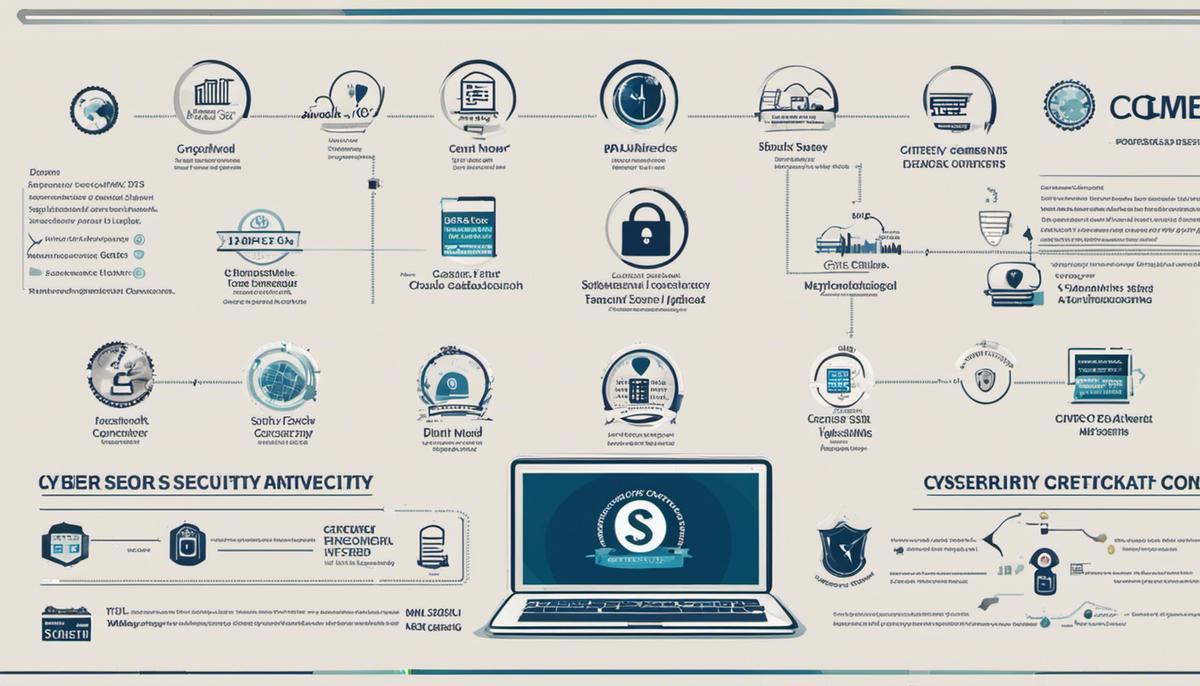The highest paying cyber security jobs are now more crucial than ever. Those in such positions ensure the safekeeping of sensitive data, networks, and systems from marauding cyber criminals. Organizations are willing to invest heavily in this area, resulting in an array of high-paying cyber security jobs. This article strives to provide a comprehensive guide to several of these high-earning roles, required skills and qualifications, as well as offer a glimpse into the current cyber security job market and potential future trends.
Types of High-Paying Cyber Security Jobs
Cyber Security: Leading the High-paying Tech Job Arena
Put aside those traditional notions of high-paying jobs. In the 21st century, cyber security has emerged as a powerhouse industry, offering a variety of elevated roles that come with attractive salaries. This booming field is an exciting mix of security, technology, and problem-solving – an ideal playground for the tech enthusiasts amongst us.
The first high-paying job that comes to mind is a Cyber Security Engineer. These individuals are the architects of secure information systems. They build, test, and implement security architecture while protecting an organization’s data from threats. The hefty paycheck these wizards receive is a direct result of the significant role they play within an organization’s ambit.
Next up is the Information Security Analyst. This role involves planning and implementing security protocols, and performing vulnerability testing and risk analyses. An Information Security Analyst is that permeating line of defense guarding the organization from harmful cyber-attacks. Sleek strategies and analytical minds merge to combat the nefarious world of cyber threats.
Following on, we find the Cyber Security Manager, a leadership role proffering superior pay. This cyber maven oversees the security team, develops and implements security strategies, and liaises with various departments to ensure the company’s digital assets are fully secure. This role truly is where management meets technology.
Significantly noteworthy is the Cyber Security Consultant. It’s a part consulting, part technology role – wherein these stalwarts assess vulnerabilities in an infrastructure and propose solutions. Apart from their technical prowess, these individuals must possess excellent communication skills. They may not be the knights in shining armor, but they definitely protect kingdoms, literally and metaphorically!
In the high echelons of cybersecurity landscape, there’s the Chief Information Security Officer (CISO). They’re in charge of an organization’s entire information security division and play a pivotal part in shaping the security policies and protecting the company’s digital assets. The higher the responsibility, the higher the pay grade – which makes the CISO role one of the most lucrative in the cyber security field.
In an age where data reigns supreme, we must not forget the Cybersecurity Data Analyst. These data-doyens mine and interpret information to identify potential security threats or breaches. They provide the analytical muscle to an already robust cyber defense team.
Cybercrime Law Specialists are the intersection of technology and law, specializing in laws related to digital crime and online privacy. With cybercrime on the rise, their expertise lands them well-paying positions that are in high demand.
The cyber security field indeed presents an array of high-paying jobs as diverse as the tech enthusiasts who pursue them. Each role demands a unique set of skills and specialization but offers a chance to solve complex problems, continually learn, and of course, claim substantial earnings. It’s more than evident – technology is not just shaping our future, it’s rewarding those who secure it too.

Essential Skills for High-Paying Cyber Security Jobs
Essential Skills for Thriving in Top-Tier Cybersecurity Positions
In the digital age, the demand for skilled cybersecurity professionals continues to skyrocket. As cyber threats evolve, so must our methods of combating them. Landing a coveted position in this field necessitates an arsenal of diversified skills that go beyond generic IT expertise. Here are some of the key skills required to not only secure, but excel in high-paying cyber security roles.
- Advanced knowledge of Security Frameworks: Stemming from Programming Languages to Security Architecture, a deep understanding of Security Frameworks is imperative. Understanding systems like COBIT, ITIL, and ISO 27001 provides a foundation for designing and implementing security measures.
- Threat Modelling: This skill involves identifying potential threats and modeling risk predictions. A thorough understanding of threat vectors, attacker tactics, and risk mitigation strategies is essential for threat modeling.
- Incident Response: High skill in Incident Response separates the ordinary from the extraordinary. This requires the ability to quickly identify, respond to, and recover from a security breach while minimizing damage and maintaining organizational reputation.
- Cloud Security: As more companies transition to cloud-based solutions, knowledge of cloud security has become imperative. Experts must be adept at securing cloud environments, understanding the specific threats they pose, and applying suitable defenses.
- Network and System Administration: A high degree of proficiency in network configuration, server maintenance, and database management can often pave the way to the highest tier of cybersecurity roles. This breadth of experience provides the holistic view necessary for robust protection measures.
- Legal and Ethical Knowledge: Cybersecurity isn’t just a technical field. It also necessitates a firm grasp of legal and ethical considerations. This includes understanding regulations like GDPR, CCPA, HIPAA, and more.
- Communication Skills: Communicating complex concepts to non-technical individuals effectively is an underrated but critical skill. It involves presenting risk assessments, explaining incident responses, and advocating for necessary security measures to stakeholders and employees alike.
- Continuous Learning: The dynamic nature of cybersecurity warrants a mindset of perpetual learning. Being able to adapt to emerging technologies, new threat vectors, and evolving tactics can make the difference between a successful defense and a catastrophic breach.
To secure those coveted cybersecurity roles and thrive in them, it’s wise to cultivate a diverse skill set that incorporates both hard technical skills and softer ones like communication and continuous learning. It’s a blend of vigor, knowledge, adaptability, and communication skills that wield the power to transform a good cybersecurity professional into a great one.

Education and Certifications for Highest Paying Cyber Security Jobs
Diving further into the world of cyber security education and certifications, while exploring high market demand and potential salary prospects, it’s ultra-important to delve into specifics that vary across roles, industries and geographical locales.
A Bachelor’s degree in a subject like computer science, information technology or cybersecurity is a solid foundation. On the other hand, a Master’s degree in cybersecurity adds immense value, and can often be a stepping stone to senior and executive-level positions. Interestingly, many roles assign significant weightage to industry experience over educational credentials, considering the practical nature of this field. Still, higher education can’t be emphasized enough, especially for those aiming for illustriously high-paying positions.
Industry certifications cut through a lot of clutter, often standing out as shiny badges that leverage a professional’s credibility. The Certified Information Systems Security Professional (CISSP) is highly desirable, perceived as the holy grail in cybersecurity certifications. Administered by ISC2, it’s designed for professionals who can develop and manage a world-class cybersecurity program.
Another top-tier certification is the Certified Information Security Manager (CISM). More executive-level in nature, it targets individuals that design and manage an enterprise’s security program. The Information Systems Audit and Control Association (ISACA) administers this certification.
The Certified Ethical Hacker (CEH) certification, courtesy of the EC-Council, is highly tempting for those who love the thrill and adrenaline rush of ethical hacking. This certification is instrumental in understanding hacker techniques, intrusion detection, virus creation, and more.
Interestingly, the Certified Cloud Security Professional (CCSP), another prominent certification introduced by ISC2, is rapidly gaining traction. It is geared towards professionals involved in IT architecture, web and cloud security engineering, information security, governance, compliance, and risk management.
For the code enthusiasts, highly specialized certifications like the Certified Secure Software Lifecycle Professional (CSSLP) can be attractive. This certification validates a candidate’s proficiency in incorporating security in each phase of the software development lifecycle.
Another highly valuable certification is the CompTIA Security+ certification. It’s universally recognized, accepted, and often a prerequisite in many cybersecurity job roles. This certification offers a broad understanding of cybersecurity principles, making it an excellent starting place for beginners.
It’s definitive to say, in the modern, globalized virtual landscape, cyber security professionals who bolster their profiles with a mix of solid education and diverse certifications are all the more likely to land high-paying roles and deliver extraordinary value.

Highest Paying Cyber Security Jobs and Future Trends
On to the juicy bit, the labor market outlook for cybersecurity professionals is nothing short of excellent. According to the United States Bureau of Labor Statistics (BLS), employment of cybersecurity professionals is expected to grow 32% from 2018 to 2028, much faster than the average for all occupations. This prodigious demand is a direct response to the increasing frequency and sophistication of cyber attacks, coupled with a current shortage of qualified cybersecurity professionals. Based on the jobs mentioned earlier, it’s clear that there’s a vast range of cyber roles commanding top-tier salaries.
As for the future, cybersecurity personnel will need to be one step ahead. Two niches in particular, AI and IoT security issues, are expected to become cutting-edge in the 2020s. Considering the strides made in Artificial Intelligence, AI-based security tools can prove to be a double-edged sword. High-profile cyber criminals can use them for malicious purposes, which may, therefore, require cyber experts skilled in counter AI tactics.
Rapid growth of devices connected to the internet (Internet of Things – IoT) is exacerbating security concerns. Consequently, IoT threats promise to rule the cybersecurity landscape in the coming years, which in turn, escalates the requirement for security experts specialized in IoT.
As the cyberthreat landscape evolves, so too must the skills of cybersecurity professionals. Emphasizing on sought-after technical skills is key, but the importance of soft skills can’t be underestimated. Being creative in problem-solving, having strong analytical thinking, and exhibiting resilience will become central to the role.
Moreover, having a good understanding of business contexts and strategic thinking will be significant. It’s not just a matter of knowing the technology but how it ties into the larger business picture. Thus, cybersecurity professionals will also need to be strategic advisors to the business, providing relevant insight into technological risks and mitigation strategies from a business standpoint.
Speaking about the certification landscape, while CISSP, CISM, CEH, CCSP, CSSLP, and CompTIA Security+ will continue to hold their value, we might observe more specialized and contemporary certifications prosper such as Certified IoT Security Practitioner (CIoTSP) or Certified AI Security Practitioner.
In conclusion, the cybersecurity job market is witnessing an intense pace of change and growth. The skills and roles needed are not only becoming more technical and diverse but also more business and strategy oriented, presenting immense opportunities for those drawn to this challenging yet rewarding field. You may start this journey with an educational degree and a certification, but continuous self-directed learning and adaptability are the real keys to flourishing in this ecosystem. Employers are seeking individuals who can evolve with the field, always up-to-date on the latest trends and will always challenge themselves. So gear up, the time is ripe to step into the world of cybersecurity.

The demanding field of cyber security consistently offers the highest paying jobs that not only offer impressive salaries but also provide a sense of meaningful work, as these professionals serve as the vanguard against cyber threats. As information and services continue to digitize, the need for skilled and educated cyber security specialists only intensifies. With knowledge of the leading roles, required skills, appropriate educational background and certifications, anyone can map a successful career journey in this promising field. As we look forward to an ever-evolving tech-focused future, it’s clear that the importance of cyber security will continue to soar along with the employment opportunities it provides.
